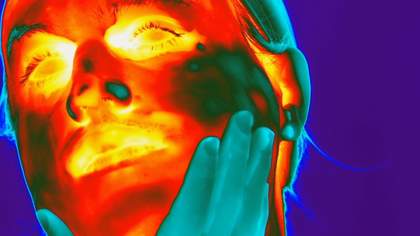11 rooms in Modern and Contemporary British Art
Weed Killer explores the experience of a person undergoing chemotherapy, considering the intersection of illness, gender and contamination
In the first part of the video, the actor and trans activist Debra Soshoux delivers a monologue drawn from Catherine Lord’s 2004 memoir, The Summer of Her Baldness. The book is an account of Lord’s experience of breast cancer, radiation and chemotherapy. The text reflects on what this treatment strips from the body, describing chemotherapy as ‘mainlining weed killer’. As Soshoux moves in and out of a thermal-imaging lens, the camera intrusively examines and exposes her body below the skin’s surface. Later, the artist Jamie Crewe delivers an impassioned lip-sync performance to an ambivalent crowd. The song speaks of thwarted love as a kind of intoxicating, all-consuming illness that permeates one’s body.
Throughout the film, Staff intertwines notions of affliction and contamination with the personal struggle for survival. The viewer is invited to examine the thin line between what is poisonous and what is curative, as one must paradoxically ingest deeply toxic substances to stay alive. The film explores how biomedical technologies have transformed the construction of our bodies. Staff says the work, ‘Ultimately becomes a reflection on what it means to survive on one's own terms’, as our journey to self-determination can bring us into close proximity to violence, illness and exclusion.
Art in this room
Sorry, no image available

